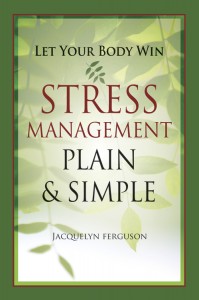What do your emotions tell you about your stress level?
From Stress for Success by Jacquelyn Ferguson
http://www.stressforsuccess.blogspot.com/
Retrieved March 15, 2016
How many people don’t connect their emotions to their stress? How many people would you guess wander through life with little awareness of their own behaviors and subsequent consequences? How many people blunder through life like a bull in a china shop?
To some degree we are all self-ignorant. We all have blind spots and miss tons of clues as to how our own reactions often cause more stress than the event to which we are reacting. Tuning into your emotions can expose many of these blind spots so you have a fighting chance of understanding how your reactions contribute to your stress.
An underappreciated window into your stress reactions is your emotions. Psychotherapists are well aware that emotions are vital in identifying what’s bothering you. You can learn about your inner emotional world to help you navigate your outer world.
Tune into your emotions to become aware of which situations and people trigger your stress response. These reactions are fueled by anger and/or fear-type emotions: impatience, irritation, intimidation, jealousy, insecurity, etc. Once you recognize these emotions it’s a short hop to feeling the tension they create in your physical body.
Who in your life easily triggers your stress emotions? When these emotions are swimming around in your body, what do you feel physically: Tension in your arms and legs? A queasy stomach? Pay attention until you can easily see the connection.
Once you make the connection between a stressful person you can recognize your emotional and physical signs of tension in response to that stimulus, you are closer to being able to choose a healthier response.
Try this: choose a person or a situation that consistently triggers your stress emotions. Try to find one that you can ignore without negative consequences.
- Make the connection between your emotional reaction to a stressful situation or person and your body tension that develops from it.
- For one week, avoid the situation or the person and pay attention to any greater sense of calmness and freedom from tension.
This will help your observing self: you can observe your emotional reactions rather than be impacted by them. Watching and witnessing your internal emotional state makes the stressor less personal. You can dampen some of the drama and be more objective. This, in turn, helps your body relax.
Over time, the development of your observing self can improve your health. You’ll become more aware of your blood pressure, physical tension, and other symptoms. Consciously observing yourself can also lower cortisol (the stress hormone) thereby protecting your body from the ravages of stress.
Your observing self requires your conscious awareness of the emotion on which you have chosen to focus. Mindfulness (maintaining a moment-by-moment awareness of our thoughts, feelings, bodily sensations, and surrounding environment) advises you to observe without judgment.
Judgment of yourself or others is a fertile area for the observing self. Observe without trying to change. Simply notice. Right behind your negative judgment, “I’m so stupid,” are negative emotions aimed at yourself. Just as when the judgment is about someone else, it triggers emotions based in anger or fear. Close on its heels are the physical signs of stress and tension.
Your observing self can help break your dysfunctional, habitual, and emotional reactions by distancing you from them, giving you a brief moment to decide how you prefer to respond. This puts you into the driver’s seat of your own life rather than being a victim to your life-long internal insecurities. I call this a “space of time” between the stressful event and your reaction to it. With this little space of time a well-developed observing self can choose a more appropriate response.
Your defensive reactions are much if not most of what feeds your physical symptoms and the resulting physical and emotional maladies. Every desire to choke someone puts pressure on your heart and adversely affects you in a multitude of other ways.
In other words, it’s not just that jerk who puts stress on you, it’s your own defensive reactions. And the only part of stress you can control is your own reaction.
Your growing observations of automatic, emotional, and defensive reactions increase your power to decide if you want to change them for your own benefit. Your choice will influence whether your blood pressure shoots up or calms down, whether your internal inflammation grows exacerbating your arthritis or subsides and calms it. It’s always your choice and yours alone.
Retrieved from http://www.stressforsuccess.blogspot.com/ 3/15/16
Ms. Ferguson is the author of Let Your Body Win: Stress Management Plain & Simple.


